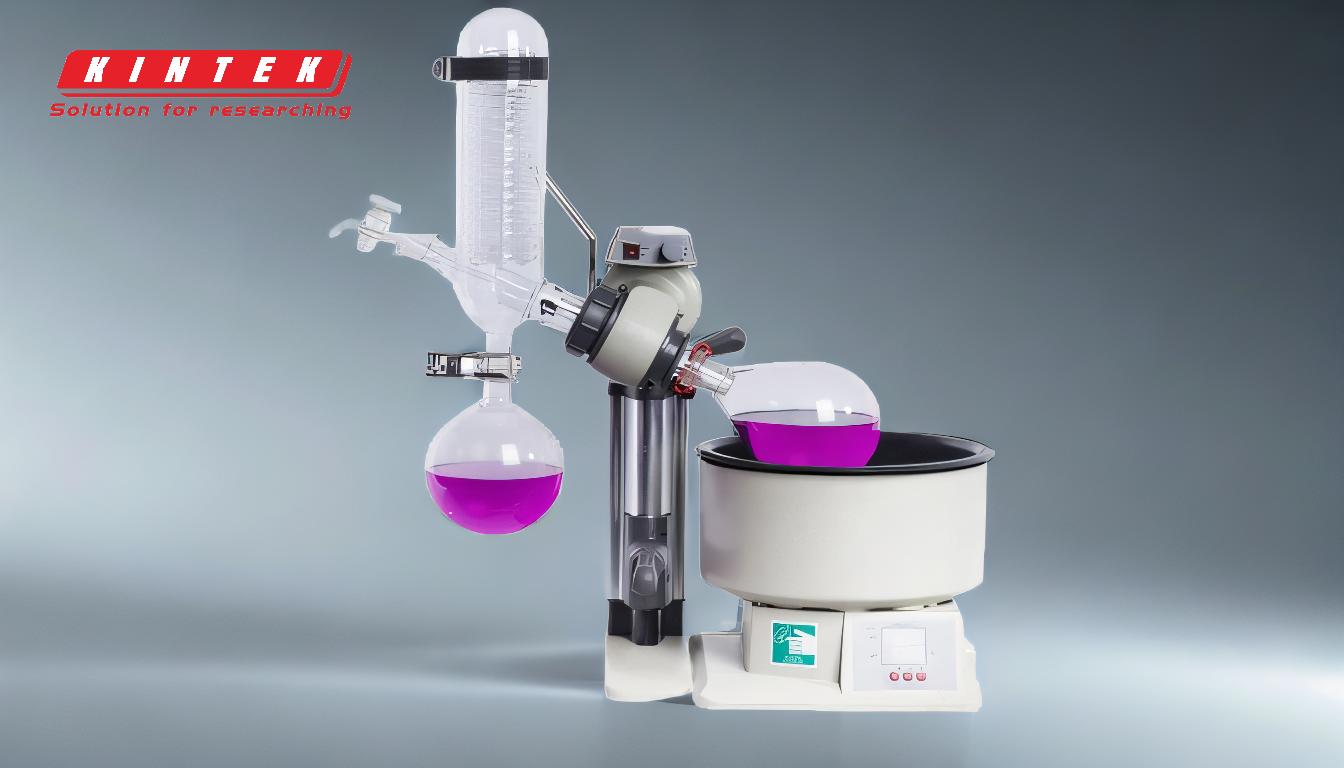Rotary evaporators, or rotavaps, are versatile tools widely used in the food industry for various applications. Their primary functions include flavor extraction, concentration, solvent removal, and purification of food products such as oils, sauces, juices, and purées. They are particularly valuable for creating concentrated flavors and aromas, which are essential in the production of high-quality food products. Additionally, rotary evaporators play a role in molecular cooking, where they are used to extract and concentrate natural essences and flavors. Their ability to handle heat-sensitive materials and operate under vacuum conditions makes them indispensable for preserving the integrity of delicate food components. Overall, rotary evaporators enhance food processing by enabling efficient separation, purification, and concentration of ingredients.
Key Points Explained:

-
Flavor and Aroma Extraction
- Rotary evaporators are extensively used to extract and concentrate flavors and aromas from food products such as oils, purées, sauces, and juices.
- The process involves evaporating solvents under vacuum conditions, which preserves the delicate flavors and aromas that might be lost during traditional heating methods.
- This is particularly important in the production of high-quality food products, where maintaining the natural essence of ingredients is crucial.
-
Concentration of Food Products
- Rotary evaporators are employed to concentrate food liquids, such as fruit juices or sauces, by removing excess water or solvents.
- This process enhances the intensity of flavors and reduces the volume of the product, making it easier to store, transport, and use in further processing.
- For example, in winemaking, rotary evaporators can concentrate grape must to create richer flavors.
-
Solvent Removal and Purification
- In the food industry, rotary evaporators are used to remove solvents from extracts or mixtures, ensuring the final product is safe for consumption.
- This is particularly important in the production of food-grade oils and essences, where residual solvents must be eliminated to meet safety standards.
- The vacuum environment of a rotary evaporator allows for gentle solvent removal without damaging heat-sensitive compounds.
-
Molecular Cooking and Culinary Innovation
- Rotary evaporators are a key tool in molecular gastronomy, where chefs use scientific techniques to create unique textures and flavors.
- They are used to extract and concentrate natural essences, such as herbal or fruit flavors, which can then be incorporated into innovative dishes.
- This application highlights the role of rotary evaporators in pushing the boundaries of culinary creativity.
-
Preservation of Heat-Sensitive Compounds
- Many food components, such as vitamins, antioxidants, and volatile organic compounds, are sensitive to heat and can degrade during traditional processing methods.
- Rotary evaporators operate under reduced pressure, lowering the boiling point of liquids and allowing for gentle evaporation.
- This ensures that heat-sensitive compounds remain intact, preserving the nutritional and sensory qualities of the food.
-
Efficiency and Scalability
- Rotary evaporators are highly efficient, enabling rapid evaporation and separation of liquids with minimal energy consumption.
- They are scalable, making them suitable for both small-scale artisanal food production and large-scale industrial applications.
- This versatility makes them a valuable asset in the food industry, where production volumes can vary significantly.
-
Applications in Specific Food Products
- Oils: Rotary evaporators are used to extract and purify edible oils, ensuring they are free from solvents and impurities.
- Juices: They concentrate fruit juices, enhancing their flavor and extending their shelf life.
- Sauces and Purées: They help reduce the water content in sauces and purées, creating thicker, more flavorful products.
- Winemaking: They concentrate grape must, improving the depth and complexity of wine flavors.
-
Integration with Other Food Processing Techniques
- Rotary evaporators are often used in conjunction with other food processing methods, such as filtration, distillation, and crystallization.
- This integration allows for the production of high-quality, refined food products with enhanced sensory and nutritional properties.
-
Compliance with Food Safety Standards
- The sterile nature of rotary evaporators ensures that food products remain free from contaminants during processing.
- Their ability to remove hazardous solvents and impurities makes them essential for meeting food safety regulations.
-
Sustainability and Waste Reduction
- Rotary evaporators contribute to sustainability by enabling solvent recovery and recycling, reducing waste in food production.
- This aligns with the growing demand for environmentally friendly practices in the food industry.
In summary, rotary evaporators are indispensable in the food industry for their ability to extract, concentrate, and purify food products while preserving their natural qualities. Their applications range from flavor extraction and molecular cooking to solvent removal and waste reduction, making them a versatile and valuable tool for food processors and innovators.
Summary Table:
| Application | Key Benefits |
|---|---|
| Flavor and Aroma Extraction | Preserves delicate flavors and aromas under vacuum conditions. |
| Concentration of Food Products | Enhances flavor intensity and reduces product volume for easier storage. |
| Solvent Removal and Purification | Ensures safe, solvent-free food products. |
| Molecular Cooking | Enables extraction of natural essences for culinary innovation. |
| Preservation of Heat-Sensitive Compounds | Protects vitamins and antioxidants during processing. |
| Efficiency and Scalability | Suitable for both small-scale and large-scale food production. |
| Sustainability | Reduces waste through solvent recovery and recycling. |
Transform your food processing with rotary evaporators—contact us today to learn more!













